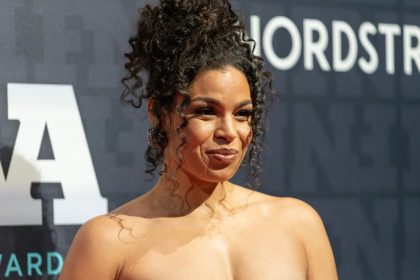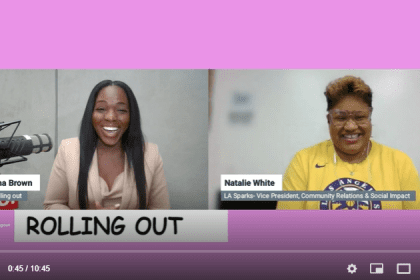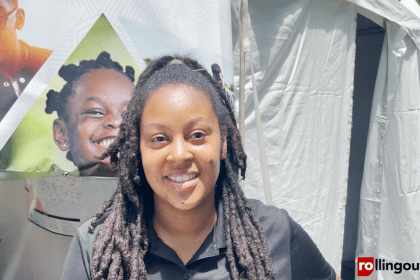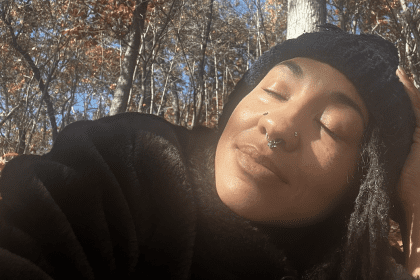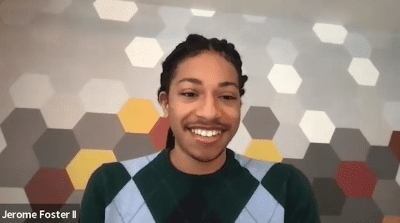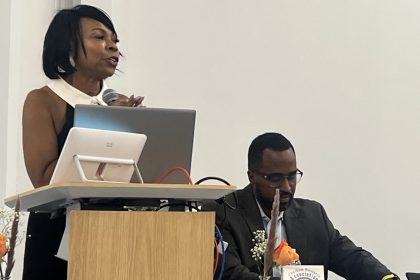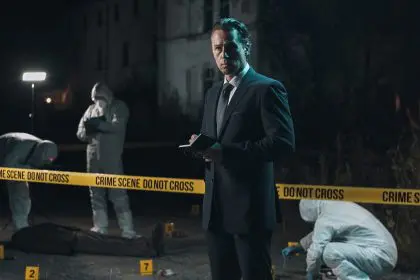John Scott is the director of government relations for Covanta, a company that specializes in delivering sustainable solutions, including converting waste to energy. He has been with the company for 8½ years, and works with local and state lawmakers, on a variety of different issues concerning environmental sustainability and community impact.
He took time out of his busy schedule to talk with rolling out publisher and CEO Munson Steed about his journey as a Black leader in sustainability and his reflections during Black History Month. Here is their conversation:
Munson Steed: This is Munson Steed and welcome to Black History Month, and I am so proud, this young man, when you think of how do we all make history? There are places we need to go, places we need to show up, places we weren’t invited that we are invited now, and places we need to build trust and understanding of how we can make a difference in not only our communities, but this entire world and universe.
I’m proud to introduce you to my dear brother from Covanta, and it is John Scott. What’s happening?
John Scott: How are you, sir? Doing well, doing well.
MS: It’s a great day over here in rolling out land, in a roller verse it’s always a great place to connect with the community, make a difference in the community, you’re doing that. Why don’t you tell us your title and kind of like a day-to-day role? Why you elected to be a part of the Covanta team?
JS: It’s been a blessing in the 8½ years that I’ve been able to go from an entry-level employee working on our electronic waste recycling side to becoming the director of government relations. Members of past and present leadership at Covanta found it in their hearts to pour into me, and that has undoubtedly helped me climb the ranks within the organization. And it’s the same thing I do for those just entering the company. Also, I try to help foster a community work spirit, because that is what it is about. It is more than just getting employees in the door. It is about keeping them around, invested, and letting them know that Covanta is a place for you to come, work, and grow your skillset.
MS: That’s a beautiful thing in terms of Black history for individuals who might be thinking about sustainability as a career, really understanding recycling how we can make a difference. When you say “pouring into you,” for somebody who really doesn’t know or wouldn’t be in a community they don’t know how to pour into somebody who is Black. How have you? And how did you receive those individuals pouring into you?
JS: Receiving invites to the important internal and external meetings early on in my Covanta career was meaningful. Those meetings helped shape the trajectory of the company and it was an exciting time as you got to see Covanta grow in real time, while moving up the waste hierarchy. I appreciate mentors like John Waffenschmidt and Dan Caraccio for advocating for me to sit at the table in those important conversations early in my Covanta career. Because of it, I gained a company knowledge base that further assisted me in thoughtfully producing solutions that involved both the community and Covanta.
MS: And, that is phenomenal, and it’s part of having the seat at the table as part of Black history. We wanted to make sure that progress is seen and measured by how many of us get to the table, so, not being the only one, but collectively raising the votes, I just thank you for sharing that insight on what it is to actually begin to add diversity and the Black community to the table of something that impacts us. But in history, how you celebrate Black History Month? How do you actually celebrate in your personal and professional life at Covanta?
JS: I grew up as the son of parents who are proud HBCU alumni and instilled in me an early sense of pride in our history. I grew up in the Washington, DC area. So, I remember seeing Black leadership in action, from people like Former DC Mayor Marion Barry, Delegate Eleanor Holmes Norton, Reverend Jesse Jackson, and others fighting for Black rights and equal opportunity.
I always pour into the Covanta host communities I work with, especially during Black History Month. So, whether it is working with my teammates to sponsor field trips to the various African American museums across the country or underwriting the costs to bring in speakers for student groups, we aim to make Black history a living piece in the communities we serve. We want to let students know that there is immense pride in being Black, and through their learning experiences inside and outside of the classroom, they can understand the contributions of Black innovators, tastemakers, and cultural icons before them.
MS: As beautiful as Duke Ellington is, who I think about when we think of those who’ve created compositions of how we can, legacies, and when I think of that, and I think of obviously, Marion, and it’s very difficult to think of DC, and not think of Marion Barry. But I think of the Congresswoman there that are all … DC is continuing to have a Black History lighthouse and then the fact that some of my favorite authors. So, the author of the Black Bourgeoisie, and all of those thinkers that were coming out of Howard University. I mean, like kind of hard to say, DC, and not say Howard like in that impact of not only can you get a college degree at Howard University. So now you’ve got advanced degrees, not just the one degree, and then, all of a sudden, there’s a medical school, so it always positions itself, so that there’s that lighthouse in DC.
One that I love obviously, in that city and the training, and then you’ve got that beautiful African American Museum done by one of my favorite architects in your city now. So, I think that the lighthouse that DC, obviously is coming out of you, and just being able to be in that environment. So now you’re in this workspace there at Covanta, kind of share, how you engage in communities, and build a trust in the ideas and the connections and the thoughtfulness given you already have this DNA. That is, you’re well aware of those things that impact our community.
JS: At an early age, I cut my teethdoing community engagement work throughout the Greater Washington, DC area. That work would take me into various pillars of the Black community, like barbershops, recreational centers, and places of worship. I gained an understanding of the importance of meeting people where they are. It was an essential thing that I learned early in life, and I take it with me here at Covanta. Getting to know people as people, we may ask questions like, “What are some things you would like to see in the community? How can we help?” The honest stakeholder feedback and the authenticity of understanding help us tailor community centered solutions. If I do not reside in a particular area, I cannot tell you what your lived experience is, but by sitting down, listening, understanding, and putting myself in your shoes, I start gaining perspective.
And so, it’s about understanding, gaining perspective, and coming to a mutual ground, which is essential for business and community engagement success.
MS: That brings me to, what has surprised you, with the impact that you can make? And if you could just share one example or so.
At Covanta, collaboration is important
JS: I’m proud of our group’s ability to collaborate. Our group is spearheaded by a dynamic leader named Tequila Smith, who instills the values of a collaborative culture and servant leadership into our team. She wants everyone on her team to personify those characteristics. In her time at Covanta, she has reimagined how our Community Outreach, Government Relations, Environmental, and Sustainability teams operate.
Even at the top of our organization, our CEO, Azeez [Mohammed] is all about collaboration and wants to achieve the best possible outcomes for our host communities. From Azeez and Tequila down to our team, the goal is for Covanta to be at the forefront of grassroots collaborative engagement and serve as a model for other organizations. We have made inroads under this new reimagined approach in a short time, which has led to us making great strides in the communities we operate in.
MS: For me, I enjoy the fact that even connecting with some real change agents in, outside of the organization, we’ve had the opportunity … where you brought to many who may have been hungry that day with food and security. And I’ve seen the moms and the expression that has come out of [that]. How would you share that experience of even being able to activate like that?
JS: Yes, it was a powerful experience. We have held it twice in our host communities and fed over 400 families through both. That experience was meaningful. It was one in which I give credit to Alyssa Wilds. She went out and listened to the community and understood their needs, and she tailor-made an event that sought to meet one of the most pressing needs. So again, it’s the collaboration and thoughtfulness that we lead with. Then I give credit to you, too, because one of the highly impactful things were the coloring books and the other literature you gave out at those events, which put big smiles on the faces of the children and parents. So, kudos to you for all that you do in our communities.
MS: No, thanks for that. And we know that there is an issue with children being able to see themselves in picture books. So, if you grow up and don’t have parents who went to HBCUs or you’re in a place where there just may not be that many Black authors writing books. I was fortunate to have gone to Morehouse, I was fortunate to have met Marion Barry, and our Mayor Jackson in Atlanta, so that you know Mayor Jackson, Marion Barry could say my name by “Hey, Munson!” It was just a different relationship, and I think that I want our children not to be invisible, wherever they are, I don’t want them to believe that they’re invisible. and they are seen, and I think that’s important. But there are some young brothers and sisters who are really trying to figure out where they’re going. You’re in an industry, talk about the importance of just being involved in a sustainability and environmental area, and a little bit of sort of our community gets wide, this is an opportunity more than anything else for us to show up, be seen, start businesses, lean in, to the environmental area and sustainability as a career, and with the purpose.
JS: Absolutely! So, I’ll use the hockey adage by the great Wayne Gretzky, “Skate to where the puck is going to be, not where it has been.” And it’s all about dealing with substantial environmental impacts in our world. And, as someone who grew up living in an environmental justice community, you want to be able to help shape the policies that impact your neighborhood. Being a part of the environmental and sustainability sector allows you to do that. We need solutions for the impacts we face now, but the challenges we could face down the road if our environmental landscape does not improve.
I would look into three career option buckets within the sustainability and environmental space, which are operations, business, and policy. A part of my job that is highly fulfilling is when we go into high schools and educate students and staff about the opportunities to work in the sector.
Before working at Covanta, I did not know career opportunities in this sector existed. In the last year of my Master’s program, I told my Professor I was unsure what I wanted to do post-graduation. She encouraged me to keep an open mind and meet with a friend of hers who was an executive at a company I had never heard of called Covanta. Upon meeting him, a casual conversation turned into an informational interview, and one colleague’s introduction led to another. Two months later, I was working as an entry-level employee, learning how to organically grow an electronic waste recycling start-up, which is a subsidiary of Covanta.
MS: Super! Anything you want to add for those individuals watching to see the phenomenal job that you’re doing and making a difference in creating our own legacy in Black history in the environmental and sustainability space?
JS: Well, if you have any questions, I am on LinkedIn. That is the best way to contact me. I am here to mentor, guide, and be a resource to people, whether at Covanta or a different organization. There are many career opportunities for individuals interested in the environmental and sustainability sector. Those career opportunities could be with various federal and state agencies, venture capital and private equity firms, and social impact organizations. The possibilities for career growth and development in the space are truly endless, so I welcome a conversation.
MS: All right, ladies, and gentlemen, you heard it first right here on rolling out. It is Black History Month, 365, and that’s John Scott. John Scott, from Covanta, thank you so much for coming on celebrating with us for now and forever. Black. Black. I am Munson Steed here at rolling out. Happy, happy, happy Black History Month and Black History Day, and every single second. It is Black History here, on rolling out.


